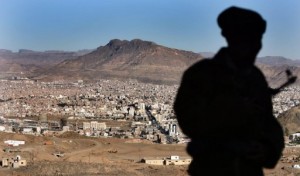S E C R E T RIYADH 000159
NOFORN
SIPDIS
FOR NEA/ARP: JHARRIS
E.O. 12958: DECL: 02/17/2025 U
TAGS: PREL, PINR, SA, YM
SUBJECT: (S) SAUDI ARABIA: RENEWED ASSURANCES ON SATELLITE
IMAGERY
REF: SECSTATE 8892
Classified By: Amb. James B. Smith for reasons 1.4 (b, c and d)
SUMMARY
——-
1. (S/NF) Ambassador met with Assistant Minister of Defense and Aviation Prince Khaled bin Sultan to relay U.S. concerns about sharing USG imagery with Saudi Arabia in light of evidence that Saudi aircraft may have struck civilian targets during its fighting with the Houthis in northern Yemen.
Prince Khaled described the targeting decision-making process and while not denying that civilian targets might have been hit, gave unequivocal assurances that Saudi Arabia considered it a priority to avoid strikes against civilian targets. Based on the assurances received from Prince Khaled, the Ambassador has approved, as authorized in reftel, the provision of USG imagery of the Yemeni border area to the Saudi Government. End summary.
USG CONCERNS ABOUT POSSIBLE STRIKES ON CIVILIAN TARGETS
——————————————— ———-
2. (S/NF) Ambassador Smith delivered points in reftel to Prince Khaled on February 6, 2010. The Ambassador highlighted USG concerns about providing Saudi Arabia with satellite imagery of the Yemen border area absent greater certainty that Saudi Arabia was and would remain fully in compliance with the laws of armed conflict during the conduct of military operations, particularly regarding attacks on civilian targets. The Ambassador noted the USGâs specific concern about an apparent Saudi air strike on a building that the U.S. believed to be a Yemeni medical clinic. The Ambassador showed Prince Khaled a satellite image of the bomb-damaged building in question.
IF WE HAD THE PREDATOR, THIS MIGHT NOT HAVE HAPPENED
——————————————— ——-
3. (S/NF) Upon seeing the photograph, Prince Khalid remarked, “This looks familiar,” and added, “if we had the Predator, maybe we would not have this problem.” He noted that Saudi Air Force operations were necessarily being conducted without the desired degree of precision, and recalled that a clinic had been struck, based on information received from Yemen that it was being used as an operational base by the Houthis. Prince Khalid explained the Saudi approach to its fight with the Houthis, emphasizing that the Saudis had to hit the Houthis very hard in order to “bring them to their knees” and compel them to come to terms with the Yemeni government. “However,” he said, “we tried very hard not to hit civilian targets.” The Saudis had 130 deaths and the Yemenis lost as many as one thousand. “Obviously,” Prince Khaled observed, “some civilians died, though we wish that this did not happen.”
HOW THE TARGETS WERE SELECTED
—————————-
4. (S/NF) Prince Khaled gave the Ambassador further background, explaining that the targets given to the Saudi Air Force were studied and recommended by a Saudi-Yemeni joint committee headed by Saudi and Yemeni general officers. That joint committee reported to him, and no targets were struck unless they had clearance from this joint committee. “Did they make mistakes? Possibly.” Prince Khaled also reported that the Saudis had problems with some of the targeting recommendations received from the Yemeni side. For instance, there was one occasion when Saudi pilots aborted a strike, when they sensed something was wrong about the information they received from the Yemenis. It turned out that the site recommended to be hit was the headquarters of General Ali Mohsen Al-Ahmar, the Yemeni northern area military commander, who is regarded as a political opponent to President Saleh. This incident prompted the Saudis to be more cautious about targeting recommendations from the Yemeni government.
CEASEFIRE COMING SOON
———————
5. (S/NF) The Ambassador told Prince Khaled that the USG is looking to Saudi Arabia to help bring an end to the Houthi fighting soon. Prince Khaled responded that Saudi Arabia is “looking for ways to end this conflict in a way that fosters good relations.” He said that he met with President Saleh last Wednesday to discuss Houthi ceasefire terms, and they agreed that, so long as the Houthis deliver on the terms they offered, there should be news about a ceasefire “within a week.” As part of the ceasefire arrangements the Yemeni military will be deployed on the Yemeni side of the border to prevent future Houthi incursions into Saudi Arabia. “Then,” Prince Khaled noted, “we can concentrate on Al-Qaida.”
COMMENT
——
6. (S/NF) Prince Khaled, in addressing the Ambassadorâs concerns about possible targeting of civilian sites appeared neither defensive nor evasive. He was unequivocal in his assurance that Saudi military operations had been and would continue to be conducted with priority to avoiding civilian casualties. The Ambassador found this assurance credible, all the more so in light of Prince Khaledâs acknowledgment that mistakes likely happened during the strikes against Houthi targets, of the inability of the Saudi Air Force to operate with adequate precision, and the unreliability of Yemeni targeting recommendations. Based on these assurances, the Ambassador has approved, as authorized in reftel, the provision of USG imagery of the Yemeni border area to the Saudi Government. While the fighting with the Houthis appears to be drawing to a close, the imagery will be of continuing value to the Saudi military to monitor and prevent Houthi incursions across the border as well as enhancing Saudi capabilities against Al-Qaeda activities in this area.
SMITH



















